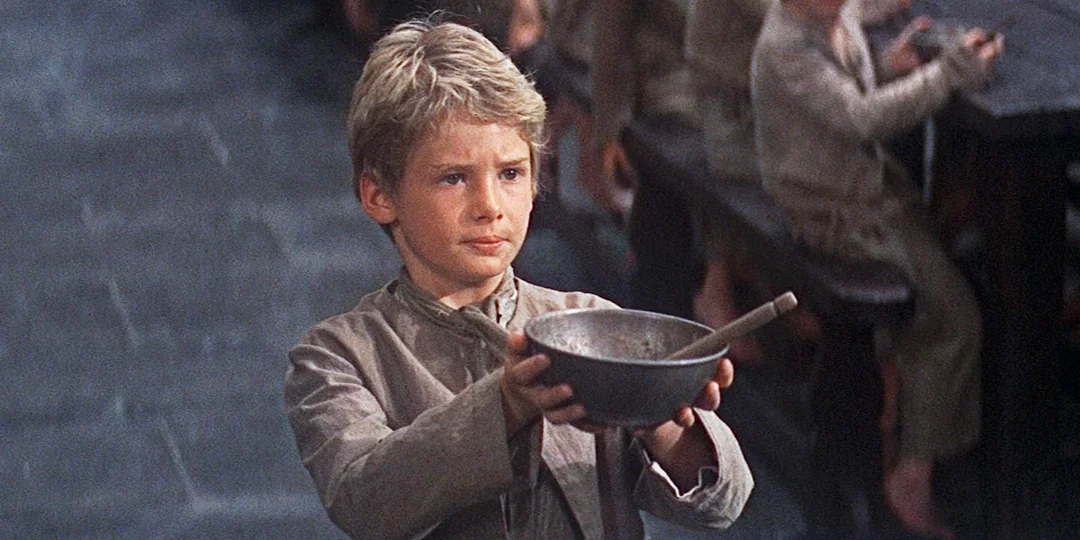Please, Sir …
This week’s quotation comes from an insightful 2002 biography of Charles Dickens by Jane Smiley, an excellent novelist in her own right. Indeed, Smiley’s deep understanding of what it takes to write an enduring novel informs her analysis of Dickens and the breathtaking array of the characters who populate his many contributions to Western literature.
Just as Smiley seemed to enjoy putting these characters on display while writing about Dickens, we had a great deal of fun trying to incorporate as many Dickensian references and echoes as possible in this puzzle. One touchstone for us was the truly poignant moment in the Dickens canon when young Oliver Twist has the temerity to ask for “some more,” captured in the image above from the 1968 film Oliver!
How many Dickens (and Dickens-adjacent) clues and answers did you spy?
For those who may not have been familiar with the reference in Clue D to an old Boston ditty – a classic in American snobbery that we can probably blame on some British colonists in Boston – here it is:
Here’s to the town of Boston,
The land of the bean and the cod,
Where the Lowells speak only to Cabots,
And the Cabots speak only to God.
We had some options to consider in clueing Answer H – Hard Times – including a straightforward reference to Dickens’ book by that name or perhaps a nod to the Charlie Chaplin film. Instead, we chose to go with a Stephen Foster song, published in 1854, coincidentally the same year that Dickens published the novel in question. The song, which gained popularity during the American Civil War, appears here in an a cappella rendition by Jennifer Warnes:


Fantastic acrostic, with a terrific quote and a generous helping of Dickens references. I struggled at first with a few incorrect answers (“yuck” for YECH, “crossbred” for INTERBRED, “Oh Susanna” for HARD TIMES). But once I had DICKENS and NE’ER-DO-WELLS in place, the rest of the quote fell into place with only a few hiccups. I loved the run of nefarious characters starting from VILLAINS and running through MADMEN.
As an aside, I wasn’t sure if SCRIVENER qualified as a Dickens reference, as it might be best known as part of a Herman Melville title. But I guess Bob Cratchit’s job would fit the description (“clerk or copyist”), so I think it belongs after all.
I had a similar solving experience (with the same word errors) as Richard Z and also enjoyed the run of non-innocent characters in the quote. Had some satisfaction finally sussing out “grotesques,” an aha moment with the saint NICHOLAS (as in Nickleby), and a chuckle with SOME MORE. Lots of fun. I never tire of reading Dickens.
“I would prefer not to” see fewer of these excellent offerings. Thank you both for your ingenuity.
Loved it, thanks! Echo everything that RichardZ said, also, I had “childsplay” for a while and, of course “yuck”.
What the Dickens is going on here? This was another charming acrostic. I had far fewer than usual gimmes, and wasn’t sure I’d be able to complete it. But with a little persistence I was able to work backward from the quote, especially after I spotted NEER-DO-WELLS and then the Dickens theme revealed itself to me and the floodgates opened. I marveled at all the sly Dickens references in the answers including MUTUAL, NICHOLAS, ARTFUL, SOMEMORE, HARDTIMES. Dickens era words abounded too, although when I saw SCRIVENER, my mind went first to Melville. I tried lechers at K instead of LEERERS which caused some minor confusion.
I’m a big fan of Jane Smiley, but was unfamiliar with her Dickens biography. I’ll have to add it to my reading queue.
What a delight! The quote is a gem, and the Dickens-related clues a treat. On first pass, I had so few answers, but LIVER and KNAVES gave me the crucial I and K of DICKENS and then I understood what realm I had entered. Such fun to write in CHARWOMAN and SCRIVENER, with special appreciation for Marley’s DOORNAIL and. Oliver’s SOME MORE. An ARTFUL puzzle, for sure. Thank you!
Dear Friends,
We are glad you enjoyed this mini-immersion into the world of Dickens, whose works supplied quotes for quite a few acrostics in the Hex era. Jane Smiley’s biography captures the man, the author, and his times with insight and acuity.
Good catch with the doornail! Meanwhile, certainly the word scrivener is most closely tied to Melville, thanks to the enigmatic Bartleby, but doesn’t he seem like the sort of quirky character who might crop up in Dickens as well?